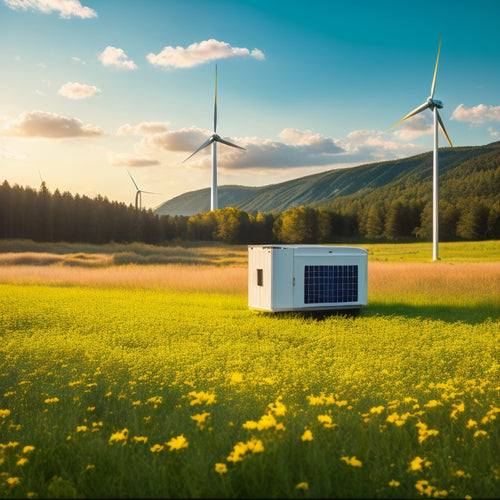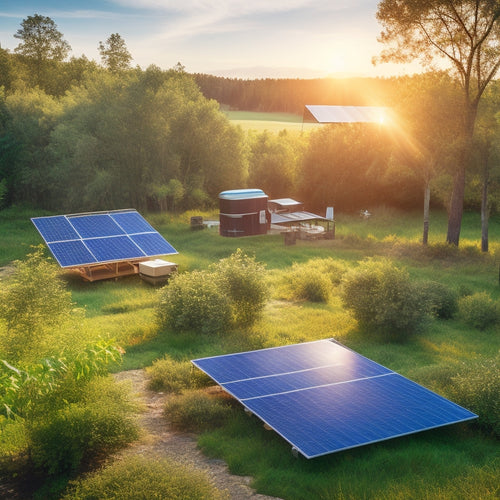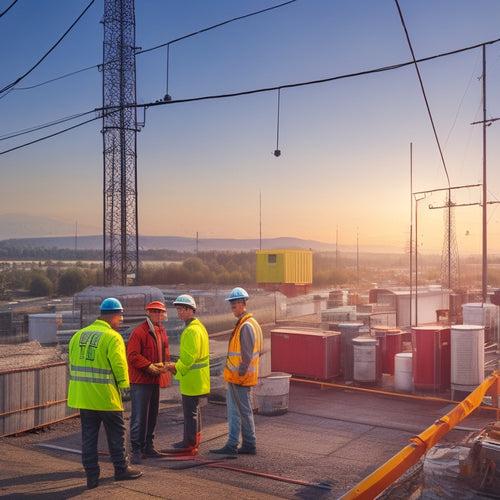
Creating an Off-Grid Solar System for Living
Share
Creating an off-grid solar system enables you to gain energy independence while reducing your carbon footprint. You'll need essential components like solar panels, charge controllers, inverters, and battery storage to effectively utilize sunlight. Start by evaluating your daily energy needs to select the right components and optimize efficiency. By using energy-efficient appliances, you can minimize consumption and maximize savings. Over time, you'll see significant reductions in utility bills and enhance your property's value. This sustainable living approach not only supports the environment but also encourages financial freedom. There's plenty more to investigate regarding specific setup tips and component choices awaiting you.
At a Glance
- Assess your daily energy needs by analyzing appliance wattage and peak usage to design an efficient solar system.
- Choose high-quality solar panels, inverters, and batteries that align with your energy demands and budget for optimal performance.
- Implement charge controllers to manage energy flow, prevent battery overcharging, and ensure system longevity.
- Incorporate sustainable living practices, such as permaculture and eco-friendly materials, to enhance self-sufficiency and reduce environmental impact.
- Take advantage of tax incentives and rebates to lower initial costs, and consider long-term savings on utility bills with off-grid systems.
Energy Independence and Sustainability
Achieving energy independence through an off-grid solar system enables you to control your energy sources and reduce reliance on external utilities.
This autonomy not only leads to cost savings over time but also promotes sustainable living practices that benefit the environment. By generating clean energy, you can enhance a self-sufficient energy lifestyle and promote independence from traditional energy sources, which contributes to a healthier planet while ensuring a stable energy supply for your home.
Off-grid solar systems provide uninterrupted power supply, minimizing power outages.
Benefits of Energy Independence
Often overlooked, the benefits of energy independence extend far beyond just reduced utility bills. When you generate your own energy, you gain control over your life and home. This autonomy enhances your energy security, shielding you from fluctuating energy prices and potential shortages. You're no longer at the mercy of external sources, and that's liberating.
Power resilience is another key advantage. By utilizing solar power, you lessen your reliance on the grid, which often faces challenges during storms or other disasters. An off-grid system guarantees you stay powered even when traditional sources fail. This reliability allows you to live confidently, knowing you can maintain your lifestyle regardless of external circumstances.
Moreover, energy independence promotes sustainability. When you produce clean energy, you contribute to a healthier environment, aligning with a lifestyle that values freedom and responsibility. You're not just liberating yourself from utility bills; you're actively participating in a solution for future generations.
Sustainable Living Practices
While many people recognize the connection between energy independence and sustainability, implementing sustainable living practices can greatly improve this relationship. By adopting these practices, you can reduce your reliance on external resources and create a more harmonious lifestyle with the environment.
Start by integrating permaculture practices into your daily routine. This comprehensive approach to gardening and land management not only maximizes food production but also enhances biodiversity and soil health. Use companion planting and natural pest control methods to minimize chemical use, which supports both your health and the ecosystem.
Opt for eco-friendly materials in your home and lifestyle choices. Whether you're building or renovating, materials like bamboo, reclaimed wood, and recycled metals offer sustainable alternatives to conventional choices. These materials aren't only better for the planet but often prove to be more durable and cost-effective in the long run.
Additionally, consider reducing waste through mindful consumption. By embracing minimalism and choosing products that are reusable or compostable, you'll greatly lower your ecological footprint.
Ultimately, these sustainable living practices enable you to take control over your energy use while nurturing a self-sufficient and environmentally responsible lifestyle.
Cost Savings Over Time
Investing in an off-grid solar system can lead to significant long-term financial benefits.
By generating your own electricity, you'll notice a steady reduction in utility expenses over time.
This shift not only encourages energy independence but also enhances your budget and contributes to a more sustainable lifestyle.
Long-Term Financial Benefits
Over the years, switching to an off-grid solar system can lead to significant cost savings. By leveraging tax incentives and government rebates, you can reduce your initial investment considerably.
These financial benefits don't stop there; an off-grid system often yields impressive investment returns over time. As energy prices rise, your savings grow, enhancing your financial independence.
Moreover, maintenance costs for solar systems are generally low, meaning you'll spend less on upkeep compared to traditional energy sources. Financing options can make installation more accessible, allowing you to enjoy the benefits sooner rather than later.
Increased property value is another key advantage; homes equipped with solar systems tend to attract buyers, enhancing resale potential.
You can also benefit from energy credits, which further offset your costs. Ultimately, the long-term financial benefits of an off-grid solar system aren't just about immediate savings.
They're about securing your financial future, increasing your property's value, and enjoying the freedom that comes with energy independence. By making this choice, you're investing not only in a sustainable lifestyle but also in a more autonomous financial future.
Reduced Utility Expenses
With an off-grid solar system, you can dramatically cut your utility expenses over time. By generating your own energy, you eliminate the need to rely on traditional utility companies, which can greatly reduce your monthly utility bill. This independence not only frees you from fluctuating energy prices but also enables you to manage your own energy consumption more effectively.
Investing in energy efficiency measures, such as high-efficiency appliances and proper insulation, can further enhance your savings. The more efficient your home is, the less energy you'll need to generate, allowing you to maximize the benefits of your solar setup. Over the years, these cost savings can accumulate, leading to a substantial return on your initial investment.
Moreover, as utility rates continue to rise, your off-grid system becomes increasingly beneficial. You'll not only avoid escalating costs but also contribute to a sustainable lifestyle, aligning your financial goals with your principles.
Embracing an off-grid solar system is more than just a financial decision; it's a pathway to freedom from the constraints of conventional energy dependency, giving you control over your resources and expenses for years to come.
System Components Overview
To create a functional off-grid solar system, you'll need to understand the essential hardware components and energy storage solutions involved. Each piece plays a critical role in utilizing solar energy and providing reliable power.
Key components include solar panels, charge controllers, inverters, and battery banks, all of which must be properly sized and integrated to guarantee peak performance and longevity.
Essential Hardware Components
Building an off-grid solar system requires a well-thought-out selection of essential hardware components that work together to capture solar energy effectively.
Start with solar panels, as they're the heart of your system, converting sunlight into electricity. Next, you'll need charge controllers to manage the energy flow, preventing battery overcharging.
When considering inverter types, choose between pure sine wave or modified sine wave inverters based on your energy needs and appliances.
Don't overlook battery banks; they store your energy for use during cloudy days or at night. Proper mounting systems are vital for positioning your solar panels to maximize sun exposure.
Wiring essentials must be high-quality and correctly sized to guarantee efficiency and safety.
For system monitoring, consider adding a display or app that tracks your energy production and usage, giving you understanding into performance.
While grid connectivity can offer backup power options, the goal is to minimize reliance on it. Familiarize yourself with installation techniques, as proper setup is key to longevity.
Energy Storage Solutions
Energy storage solutions play an important role in any off-grid solar system, ensuring that you have access to electricity even when sunlight isn't available. The heart of your energy storage lies in battery technologies. Selecting the right battery type—like lithium-ion or lead-acid—can greatly impact your system's energy efficiency and longevity.
You'll also need solar inverters to convert the direct current (DC) from your batteries into alternating current (AC) for household use. Charge controllers are essential, too. They regulate the voltage and current coming from your photovoltaic panels, preventing battery overcharging and ensuring smooth energy management.
Embracing off-grid advantages means you're not reliant on grid-tied systems, which gives you freedom and autonomy over your energy consumption. However, you must stay vigilant about system maintenance. Regular checks on batteries, inverters, and connections will keep your renewable resources operating effectively.
Ultimately, investing in quality energy storage solutions enhances your off-grid lifestyle, providing a reliable power source while minimizing environmental impact. By choosing the right components, you're setting yourself up for a sustainable and independent energy future.
Selecting Based on Energy Needs
To create an effective off-grid solar system, you need to start by evaluating your daily energy usage.
This evaluation helps you determine the appropriate solar components, ensuring your system meets your specific needs. By understanding your energy requirements, you can select the right size and type of solar panels, batteries, and inverters for peak performance.
Additionally, conducting a thorough energy needs evaluation will allow you to identify high usage areas and find opportunities for reduction, ultimately leading to a more efficient system.
Assessing Daily Energy Usage
When planning your off-grid solar system, accurately evaluating daily energy usage is essential for selecting the right components. Start with an energy consumption analysis to determine how much power you actually need. Make a list of all your appliances, devices, and systems that require electricity. Note their wattage and how many hours you use each daily. This will give you a clearer illustration of your total energy demand.
Next, focus on peak usage identification. Identify when your energy consumption is at its highest, as this will inform your battery and inverter sizing. For example, if you run multiple devices simultaneously during the evening, you'll need to account for that peak demand to avoid system overload.
Consider energy-efficient appliances and practices to reduce your overall usage, allowing for a more sustainable system. By understanding your daily energy usage patterns, you'll not only optimize your solar setup but also enhance your off-grid living experience.
This careful assessment enables you to achieve the freedom and independence you desire while ensuring your system meets your energy needs effectively.
Choosing Appropriate Solar Components
Selecting the right solar components is essential for creating an efficient off-grid system that meets your specific energy needs.
Start by evaluating solar panel types; monocrystalline panels are efficient but pricier, while polycrystalline panels offer a more budget-friendly option.
Next, consider your inverter options. A pure sine wave inverter is ideal for sensitive electronics, guaranteeing they function properly.
Battery technologies play a significant role in storing energy for cloudy days. Lithium-ion batteries provide longevity and efficiency, while lead-acid batteries are more affordable but require regular maintenance.
Charge controllers are crucial for regulating energy flow, protecting your batteries from overcharging.
Don't overlook mounting systems. They should be sturdy and adjustable to optimize sunlight exposure throughout the year.
Wiring considerations are also important; using the right gauge prevents energy loss and guarantees safety.
Lower Environmental Impact
When you opt for an off-grid solar system, you're greatly reducing your carbon footprint.
By utilizing renewable energy, you decrease reliance on fossil fuels, which are major contributors to greenhouse gas emissions.
This shift not only benefits the environment but also promotes a sustainable lifestyle for you and future generations.
Reduced Carbon Footprint
In recent years, the push towards off-grid solar systems has gained momentum, primarily due to their ability to considerably reduce your carbon footprint. By utilizing renewable energy, you're not just cutting down on fossil fuel reliance; you're actively participating in carbon offsetting strategies that benefit the environment.
Each kilowatt-hour generated from solar power means less greenhouse gas emissions, allowing you to live in harmony with nature.
Investing in an off-grid solar system can also help you achieve renewable energy certifications, which validate your commitment to sustainability. These certifications can enhance your property's value and appeal, making it an attractive option for eco-conscious buyers in the future.
As you investigate these systems, reflect on how much energy you truly need and how to maximize efficiency. This could involve optimizing your solar panel placement and integrating energy storage solutions.
By doing so, you're not only ensuring a reliable power source but also minimizing waste and promoting a sustainable lifestyle.
In embracing off-grid solar technology, you're taking a significant step towards environmental freedom, reducing your carbon footprint while enjoying the independence that comes with generating your own energy.
Frequently Asked Questions
How Do I Maintain My Off-Grid Solar System?
To maintain your off-grid solar system, regularly check your inverter for performance issues and schedule battery maintenance. Keeping connections clean and monitoring charge levels guarantees efficiency, maximizing your system's potential for freedom and sustainability.
What Happens During Extended Cloudy or Rainy Periods?
When clouds roll in, your solar efficiency drops faster than a lead balloon. But don't fret! With adequate energy storage, you can weather those gloomy days and maintain your freedom without a hitch.
Can I Expand My Solar System Later On?
Yes, you can expand your solar system later. By evaluating your current system capacity, you can plan for future upgrades, ensuring you meet your developing energy needs while maintaining your independence and freedom.
Are There Any Legal Restrictions for Off-Grid Installations?
Yes, there're legal restrictions for off-grid installations. You'll need to check zoning regulations, permit requirements, utility interconnection, and safety standards in your area to verify compliance and maintain your freedom to live sustainably.
How Can I Monitor My Solar System's Performance Remotely?
To monitor your solar system's performance remotely, you can use apps, sensors, and smart meters. These tools provide real-time data, track energy production, and help you optimize efficiency, ensuring you maintain your freedom and independence.
Explore More
In crafting your off-grid solar system, you're not just cutting costs; you're cultivating a cleaner, conscious lifestyle. By prioritizing energy independence and understanding your unique energy needs, you'll reveal a sustainable solution that serves both your wallet and the planet. Accept the expedition of energy efficiency and environmental enlightenment, and watch as your investment in solar sparks savings and serenity. With careful consideration and commitment, you're paving the path to a brighter, greener future.
Related Posts
-

Sustainable and Eco-Friendly Generators for a Reduced Carbon Footprint
Sustainable and eco-friendly generators are perfect for cutting your carbon footprint and increasing energy efficienc...
-

Top Off Grid Solar Batteries for Renewable Energy
When seeking top off-grid solar batteries for renewable energy, consider options with advanced battery chemistry, suc...
-

Smart Grid Technology Implementation Challenges
You'll encounter several challenges when implementing smart grid technology, particularly in cost management, scalabi...


